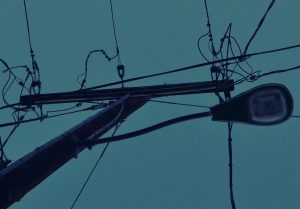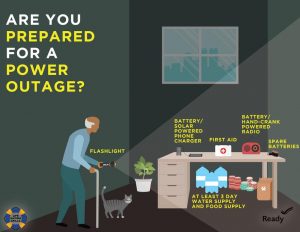State agency provides tips for surviving extended power outages
Chronicle Media — August 13, 2020
Due to the destructive straight-line winds associated with this storm, power lines, utility poles, substations and towers were damaged or destroyed, resulting in extensive repairs that will extend the restoration timeline several more days.
(Photo courtesy of ready.gov)
SPRINGFIELD – Power outages are more than just inconvenient; they can be dangerous. That’s why the Illinois Emergency Management Agency (IEMA) and local emergency managers are highlighting various safety tips to help recent storm survivors.
At the height of the Aug. 10 storm, more than 683,000 customers were without power in Illinois. Due to the destructive straight-line winds associated with this storm, power lines, utility poles, substations and towers were damaged or destroyed, resulting in extensive repairs that will extend the restoration timeline several more days.
(Derecho storms produced 11 tornadoes across northern Illinois)
“From food poisoning to carbon monoxide dangers, power outages are extremely hazardous if the proper precautions are not followed during a disaster,” said IEMA Director Alicia Tate-Nadeau. “August is typically one of the hottest months of the year. Older adults and young children are especially vulnerable to extreme temperatures. Community resiliency is built by neighbors helping neighbors, especially in a time of great need – such as a disaster.”
Another hidden danger associated with power outages lurks in your refrigerator and freezer. During a power outage you should always keep the refrigerator and freezer doors closed as much as possible to maintain a cold temperature. A refrigerator will keep food cold for about four hours, if it is unopened. A fully stocked freezer will keep food frozen two days, if the door remains closed. A half-full freezer can keep foods frozen for about one day.
“Foods such as meat, poultry, milk, eggs, cheese, and other items that require refrigeration should never be consumed if at any point the food was above 40°F for more than two hours,” said Illinois Department of Public Health (IDPH) Director Dr. Ngozi Ezike. “Foods that are not kept adequately refrigerated or frozen may cause illness if eaten, even when they are thoroughly cooked.”
 Other important safety tips include:
Other important safety tips include:
- Only use generators outdoors and away from windows to avoid carbon monoxide poisoning. Generators, camp stoves, or charcoal grills should always be used outdoors and at least 20 feet away from windows.
- Disconnect electronics and equipment to avoid damage from electrical surges. Power may return with momentary “surges” or “spikes” that can cause damage.
- Have alternate plans for refrigerating medicines or using power-dependent medical devices. If the power is out for more than a day, discard any medication that should be refrigerated, unless the drug’s label says otherwise. If a life depends on the refrigerated drugs, consult a doctor or pharmacist and use medicine only until a new supply is available.
To learn more about staying safe during a power outage, visit ready.illinois.gov







